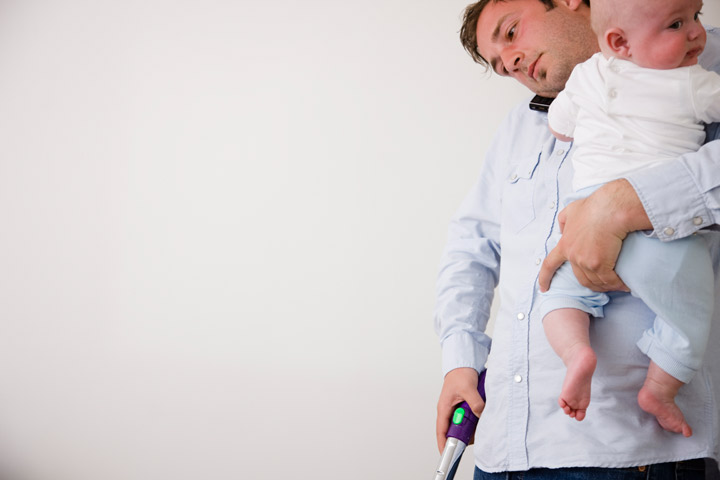You don’t have time for the gym when you’re burping, feeding and changing your baby’s diaper. New research suggests that it’s not just new moms that are battling post-baby weight – first-time fathers also see changes in their waistline when a new addition arrives in the family.

Northwestern University doctors say that the average six-foot-tall man gains about 4.4 pounds in the year after becoming a dad. His body mass index creeps up by about 2.6 per cent.
“Fatherhood can affect the health of young men, above the already known effect of marriage,” lead author and pediatrics professor, Dr. Craig Garfield, said in a university statement.
“You have new responsibilities when you have your kids and may not have time to take care of yourself the way you once did in terms of exercise. Your family becomes the priority,” Garfield said.
READ MORE: Father’s Day – How fatherhood changes a man’s brain
Scientists have already documented the physical changes to the body after men get married and while their partners are pregnant. There’s no polite way to say this: new husbands and expectant dads get out of shape.
In 2014, a study warned that men who tied the knot had a higher risk of being overweight than their bachelor counterparts.
In May 2009, researchers suggested that men put on a whopping 14 pounds while their wives were pregnant – the men in the study reported that they were eating out more with their expectant partners, there were more snacks around the home and they picked up on their partners’ eating-for-two habits.
This time around, Garfield and his team tracked the weight of more than 10,000 men from adolescence into adulthood for 20 years. Once they hit the milestone of fatherhood, their pants got a little tighter: if new dads were living with their babies, they’d gain 4.4 pounds while dads who didn’t live with their newborn gained about 3.3 pounds.
READ MORE: Mother’s Day – How motherhood changes a woman’s brain
Men without daddy duties actually lost 1.4 pounds over the same time period. Age, race, education, income, exercise levels, screen time and marital status were all factors the scientists controlled for.
The researchers didn’t interview the study subjects but conducted their own guesswork as to what may be at play. New dads are making breakfast, lunch and dinner for their babies, they’re spending sleepless nights tending to their newborn and they probably aren’t carving out time for their own health and wellness.
The house shifts from meal prep for the week and carefully planned dinners to feeding a growing baby so convenience takes the forefront.
“We all know dads who clean their kids’ plates after every meal,” Garfield noted. He even conceded to eating his kids’ leftovers when they’re done with their dinner.
READ MORE: How a father’s diet, lifestyle affect his baby’s healthy development
The researchers say that pediatricians may be the frontline health care workers to keep a watchful eye on daddies. These men may not be getting their annual visit but they’re certainly taking their kids to the doctor for vaccinations and other checkups.
“We now realize the transition to fatherhood is an important developmental life stage for men’s health. It’s a magical moment where so many things change in a man’s life. Now the medical field needs to think about how we can help these men of child-rearing age who often don’t come to the doctor’s office for themselves,” Garfield said.
READ MORE: Newborn baby’s smell is as addictive as drugs or food, study says
Garfield’s full findings were published Tuesday morning in the American Journal of Men’s Health.
carmen.chai@globalnews.ca
Follow @Carmen_Chai




Comments